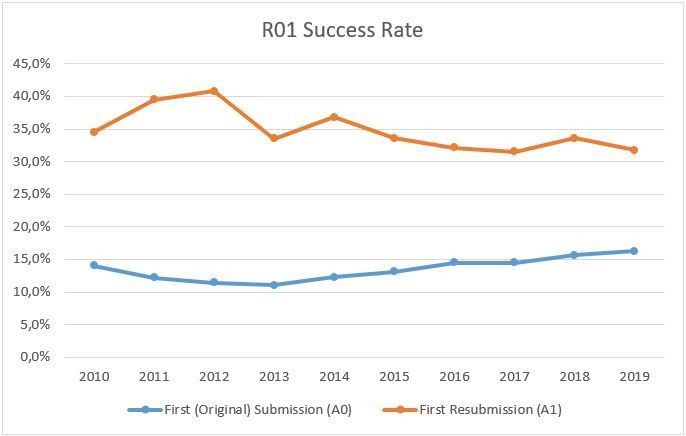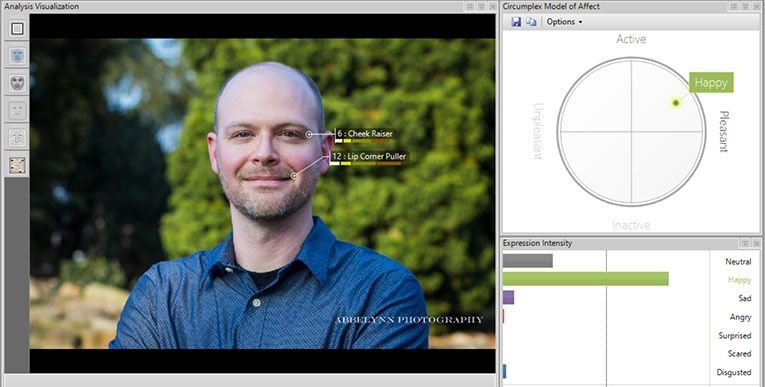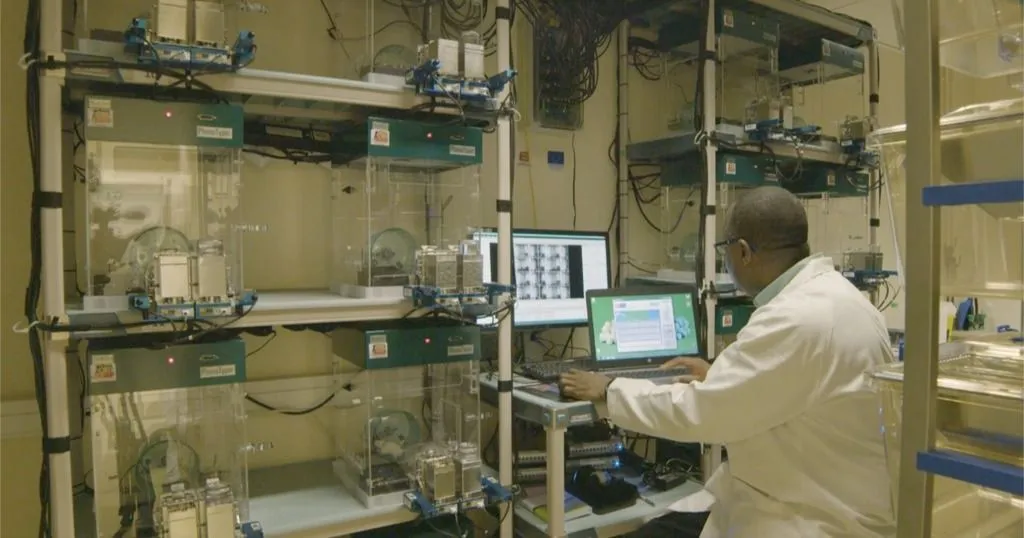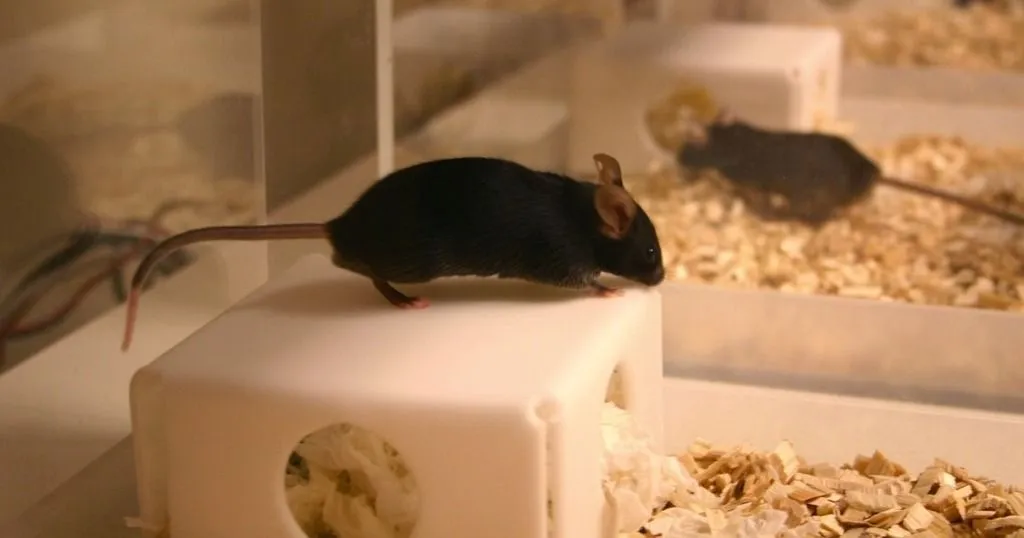Noldus Grant Assistance Program launched in North America
Grant funding is the lifeblood of academic research. Is successful funding the best path to securing future funding?
Posted by
Published on
Mon 25 May. 2020
Topics
| EthoVision XT | Behavioral Research | Brain Research | Video Observation | Video Tracking | Grants | NIH |

Grant funding is the lifeblood of academic research. In the United States, the pinnacle of research awards is the NIH R01 grant. At many universities, getting a R01 is the key to getting tenure1; however, according to data provided by NIH, only 16.3% of applicants get awarded on the first submission, and 31.7% get funded on the first resubmission2. Furthermore, funding rates have remained relatively stable for the past ten years (see Figure 1). The Canadian equivalent of such an award is provided by the Canada Foundation for Innovation (CFI). In the science sector, only 18% of proposals were funded in 20173.
Noldus Grant Assistance Program launched in North America
Moreover, there is ample evidence to support the idea of a “Matthew Effect”4, meaning that successful funding is the best path to securing future funding. Where does that leave new researchers, professors at smaller institutions, and especially minorities5? There are proposed solutions6, but one thing is clear: There is an obvious need to help academics in the path to funding.
As of May 2020, Noldus Information Technology offers to do just that.

Two goals of the Grant Assistance Program
Dubbed the Grant Assistance Program, the goals of the program are simple enough: help researchers get funding. To do this, Noldus has tasked Jason Rogers, PhD, with designing the program and establishing connections with researchers and partners.
For researchers, the program serves two purposes: First, to assist with the writing, reviewing, and capturing of grants by providing budget justifications, use cases, behavioral protocols, publications, documentation, insider tips, and general writing assistance. We are happy to provide researchers with the leg work necessary to demonstrate the effectiveness, validity, and reliability of our solutions.
The second goal of the program is to locate funding sources, funding requests (RFPs), etc, and share them with our academic community. We understand that researchers spend their days teaching and doing research. As such, they don’t always have the time to search for new funding opportunities. Our mission as a research partner is to help find them!
This reflects our core values
The best part: All of this comes at no cost to the researcher! This program reflects the core values embedded into the DNA of Noldus: “Our tools support the objective assessment of health and well-being, in humans and animals, and thus contribute to better solutions”7. This can be seen in Noldus’ response to the global Coronavirus COVID-19 (SARS-CoV-2) crisis. Furthermore, approximately 60% of employees in North America have advanced degrees (MBA, MS, PhD). We are committed to researchers because we are very much a part of the research community.
WRITE BETTER PROPOSALS - GET YOUR FREE GUIDE HERE
We offer resources to locate funding sources and assist with the grant writing process, with no cost or commitment to you!
Download for freeStay tuned!
In the coming months, we will be publishing a series of blogs aimed at helping write better, more successful grant proposals. Stay tuned and be sure to check back as more content becomes available.
About Jason Rogers
Jason got his PhD from the Department of Psychology at University of Utah, under the guidance of Ray Kesner. His dissertation focused on the interactions and dissociations between the hippocampus and parietal cortex in processing spatial information. He was a Post-Doctoral Fellow in the Department of Neuroscience at the Medical University of South Carolina.

His research focused on the neuropsychopharmacology of relapse to drugs of abuse. It was during this time that Jason first received NIDA funding. In 2008, Jason joined Noldus as the lead trainer and product specialist. Along the way, Jason has been providing online and remote trainings, sales in the Midwest, and consulting for all of North America.
Jason has held seminars, lectures, and trainings on four continents and has visited approximately 75% of the academic universities and the entire continental USA. Despite not publishing a peer-reviewed publication in over twelve years, Jason maintains a H-Index above 10. He has a passion for research, psychology, neuroscience, and new age music.
Grant Assistance Program
Contact us today to begin a collaboration: Together we can create something special.
LET'S TALK
Start your journey with us today! Get in touch if you want to:
- Advance your research
- Get expert guidance
- Profit from our 35+ years of experience
References
- National Research Council (US) Committee on Bridges to Independence: Identifying Opportunities for and Challenges to Fostering the Independence of Young Investigators in the Life Sciences. Bridges to Independence: Fostering the Independence of New Investigators in Biomedical Research. Washington (DC): National Academies Press (US); 2005. 6, Establishing Stable Research Programs. Available from: www.ncbi.nlm.nih.gov/ Excel see, retrieved from: report.nih.gov/success_rates
- Data retrieved from: report.nih.gov/nihdatabook
- Canada Foundation for Innovation, retrieved from: www.innovation.ca
- Bol, T.; de Vaan, M.; van de Rijt, A. (2018). The Matthew effect in science funding. Proceedings of the National Academy of Sciences May 2018, 115 (19) 4887-4890; DOI: 10.1073/pnas.1719557115
- news.feinberg.northwestern.edu/2020/01/funding-disparities-research-and-underrepresented-minority-scientists/
- Retrieved from: thedailytexan.com/2018/04/08/scientific-funding-problems-have-solutions
Related Posts
How to get reliable results on object recognition using video tracking

5 steps to set up the perfect behavioral suite
